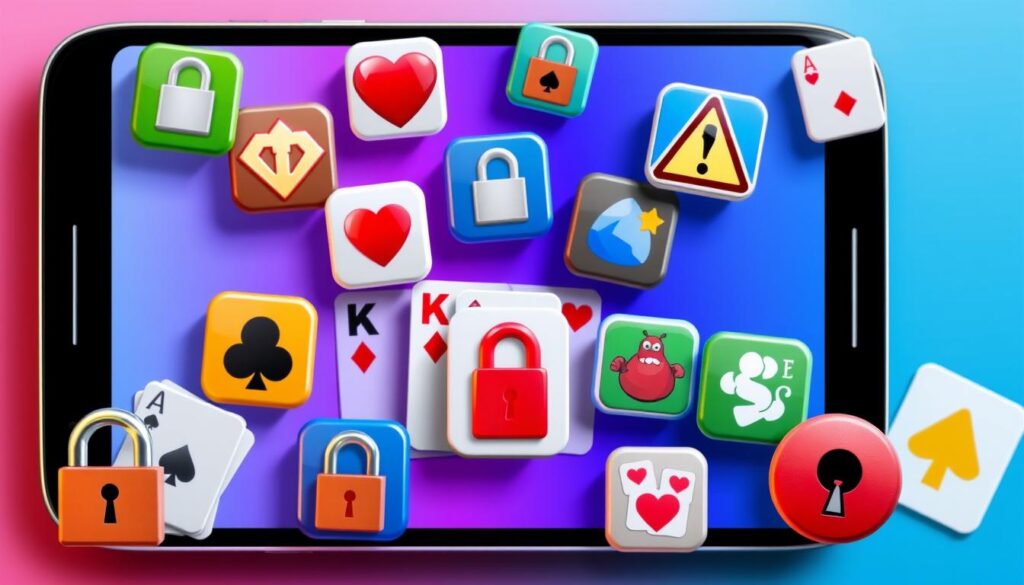are solitaire games scams

Solitaire games have moved from physical cards to our smartphones and tablets. This shift has raised questions about their fairness. Are these games scams or genuine?
This article explores the world of digital solitaire. We look at how these games have grown in the mobile gaming world. We also examine the mechanics behind them. Our goal is to help you understand the truth about solitaire games.
Key Takeaways
- Solitaire games have evolved from physical cards to digital platforms, leading to concerns about their legitimacy.
- The current market size and player base for mobile solitaire games are significant, reflecting their widespread popularity.
- Understanding the mechanics behind digital solitaire games is crucial to evaluating their fairness and trustworthiness.
- Concerns about random card generation, win rates, and payment systems in solitaire games need to be thoroughly investigated.
- Distinguishing between legitimate and suspicious solitaire apps is essential for safe and enjoyable gaming experiences.
The Rise of Digital Solitaire Games in Mobile Gaming
Gaming has changed a lot, with digital solitaire games becoming super popular on phones. Solitaire, once just a card game, is now enjoyed by people all over the world on their devices.
Evolution from Physical Cards to Digital Platforms
It’s easy to see why solitaire moved from cards to mobile gaming. With tech, playing solitaire anywhere, anytime became possible. This made it a favorite activity for many.
Current Market Size and Player Base Statistics
The solitaire app market has grown a lot lately. More and more people are playing digital solitaire. Stats show it’s a top choice for mobile gamers, appealing to many different people.
Popular Solitaire Game Variations
With digital solitaire, there are many game types to choose from. You can play classic games like Klondike and Spider Solitaire, or try newer ones like Pyramid and FreeCell. This variety means there’s a game for everyone.
| Solitaire Game Variation | Description | Popularity |
|---|---|---|
| Klondike Solitaire | The classic solitaire game with its iconic tableau and stock piles. | Widely played and considered the most popular digital solitaire game. |
| Spider Solitaire | A more challenging solitaire variant that involves multiple decks and strategic card placement. | Gaining traction among digital solitaire enthusiasts seeking a greater challenge. |
| Pyramid Solitaire | A unique solitaire game where players must clear a pyramidal arrangement of cards. | Emerging as a popular alternative to traditional solitaire games on mobile platforms. |
| FreeCell Solitaire | A strategic solitaire game that provides players with additional cells for card manipulation. | Maintaining a loyal following among digital solitaire players who appreciate its tactical depth. |
The growth of digital solitaire games has changed how we play solitaire on phones. It offers a wide range of fun games right at our fingertips.
How Digital Solitaire Games Actually Work
Many people think digital solitaire games are just about luck. But, they are actually based on solitaire game mechanics and algorithms. These ensure a fair and fun game for everyone.
The heart of digital solitaire is digital card shuffling. Instead of a real deck, these games use math to shuffle cards. This makes every game different, making it more exciting and challenging.
The solitaire algorithms make sure the game is fair. Each game is a real test of strategy. Knowing how digital solitaire works helps players appreciate the skill needed to win.
But there’s more to digital solitaire than just the tech. These games also have features that make playing fun. They have easy-to-use interfaces and smooth gameplay. This makes them enjoyable for players of all levels.
Are Solitaire Games Scams: Investigating Common Concerns
Solitaire games are a favorite for many in today’s digital world. But, some worry about their fairness. Let’s look into what makes solitaire games either scams or just fun games.
Analyzing Random Card Generation
One big worry is if solitaire games are fair. Good solitaire games use strong random number generators. This makes sure each card deal is random and fair, keeping the game challenging and fun.
Understanding Win Rates and Odds
Winning a solitaire game depends on the game type and how good you are. Some games are harder to win, but they’re still fun. Game makers should tell you how likely you are to win, so you know what to expect.
Examining Payment Systems
Many solitaire games let you buy extra features or play more. These deals should be clear and worth it. Good games don’t trick you into spending more than you want, keeping the game fair and honest.
By tackling these issues, game makers show they care about fair play. It’s smart for players to do their homework before playing solitaire games.
| Aspect | Explanation | Potential Concerns |
|---|---|---|
| Random Card Generation | Solitaire games use random number generators to mix up the cards. | Not being clear or messing with the random process. |
| Win Rates and Odds | Winning chances change with the game and your skill. | Creating games that are almost impossible to win to upset players. |
| Payment Systems | Games might let you buy extra stuff or play more. | Using sneaky ways to make you spend more than you should. |
By tackling these issues, game makers show they care about fair play. It’s smart for players to do their homework before playing solitaire games.
Legitimate vs. Suspicious Solitaire Apps
Solitaire apps are a big hit in mobile gaming. But, not all are the same. It’s important to know the difference between good and bad apps. Look at the developer’s reputation, app store ratings, and what other users say.
Good solitaire games come from trusted companies. These apps usually get high ratings and positive feedback. People say they are fair and don’t scam players. On the other hand, bad apps might have low ratings and complaints about unfair play or scams.
- Examine the app’s developer: Research the company’s background, previous apps, and user feedback to ensure a reputable track record.
- Check the app store ratings: Look for solitaire games with consistently high ratings and positive reviews from a large user base.
- Scrutinize user reviews: Pay attention to comments that highlight fair gameplay, transparent monetization, and a lack of suspicious activity.
| Legitimate Solitaire Apps | Suspicious Solitaire Apps |
|---|---|
| Developed by reputable companies | Questionable developer history |
| High app store ratings (4.5+) | Low app store ratings (below 4.0) |
| Positive user reviews praising fairness | User complaints about rigged gameplay or scams |
By carefully checking solitaire apps, you can have fun without worries. Stay away from apps that might scam you.

Money-Making Claims in Solitaire Games: Fact or Fiction
Solitaire apps are getting more popular, with promises of real cash rewards. But are these claims true? We’ll look into the truth behind solitaire games’ money-making claims. This includes cash prizes, online tournaments, and how payments work.
Real Cash Rewards Analysis
Some solitaire games offer cash prizes, but it’s important to check the details. Many of these prizes come with in-app purchases or entry fees. This makes it hard to tell if they’re real rewards or hidden costs.
Players should always read the terms and conditions carefully. This way, they can understand what these “cash prizes” really are and how to get them.
Tournament Legitimacy Check
- Online solitaire tournaments promise big cash prizes, but are they real?
- Good tournaments have clear rules, secure payment methods, and a history of paying out.
- Watch out for tournaments with unclear or unfair terms. They might be scams.
Payment Processing Red Flags
When looking at solitaire games with cash rewards, payment systems are key. Look for secure payment methods, verified payouts, and follow local gambling laws. Any strange payment practices could be a scam.
| Solitaire Cash Prizes | Online Tournaments | Payout Verification | Gambling Regulations |
|---|---|---|---|
| Read the terms and conditions to know what “cash prizes” really are. | Find tournaments with clear rules, secure payments, and a good payout history. | Make sure the payment system is safe and follows local laws. | Check if the solitaire app follows gambling laws in your area. |
By checking the money-making claims in solitaire games, players can make smart choices. It’s important to know what’s real and what’s not in mobile gaming. This way, everyone can have a safe and fun experience.
Data Privacy and Security in Mobile Solitaire Games
Mobile solitaire games are getting more popular. This means data privacy and security are more important than ever. Players share personal info like contact details and payment data with these apps. It’s crucial to keep this info safe.
App data protection is a big worry in mobile gaming. Good solitaire game makers use strong security like encryption and updates. They also tell players how they use their data, helping players stay safe.
Mobile game security is also key. Hackers might try to get into solitaire games to steal info. But, top developers use strong cybersecurity in gaming to keep players safe. They use things like two-factor authentication and secure payment systems.
| Best Practices for Secure Solitaire Gaming | Risks of Unsecured Solitaire Apps |
|---|---|
|
|
By focusing on data privacy and security, solitaire game makers can earn player trust. Players should be careful and pick apps that protect their data well.

Identifying Predatory Monetization Tactics
Digital solitaire games are getting more popular. It’s important to know about bad monetization tactics. These tactics can ruin the fun and fairness of the game, focusing on making money instead of player happiness.
Hidden Fee Structures
Some games have hidden fees. Players might pay extra for features or content without knowing. This can cause financial surprises and frustration.
Psychological Manipulation Techniques
Game developers use tricks to keep players playing and spending. They might use rewards that change, messages that make you feel left out, and other tricks that play on our minds.
Advertising Practices
Too much advertising can be a problem. Games might show too many ads, like banners or videos, that get in the way. This can make the game less enjoyable and unfair.
Knowing about these tactics helps players choose better games. It ensures they have a fun and fair experience.
Best Practices for Safe Solitaire Gaming
To enjoy safe mobile gaming, follow responsible gaming tips for solitaire. First, research solitaire apps well. Read reviews and check if they are real to avoid scams. Choose apps from trusted developers with clear in-app purchase rules.
Control your spending in apps by setting limits and avoiding quick buys. Watch out for tricks like limited-time offers that might make you spend too much. Keep your gaming fun and balanced to avoid getting too caught up.
Also, protect your personal info by checking an app’s privacy policy before you install it. Pick solitaire games that respect your privacy and don’t collect your data unfairly. Follow these tips to enjoy solitaire safely and keep your digital life healthy.

Leave a Reply